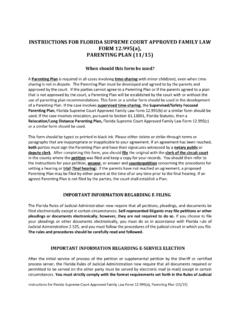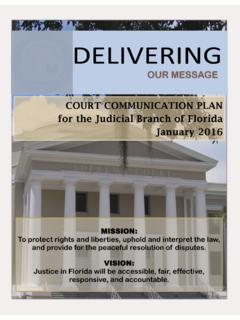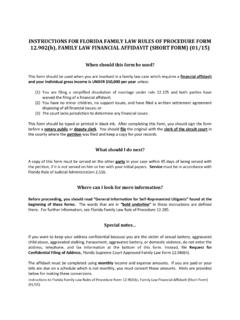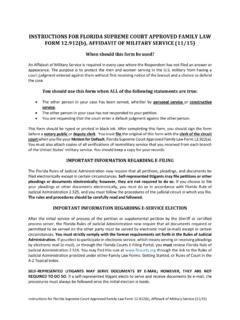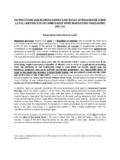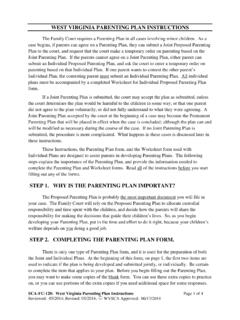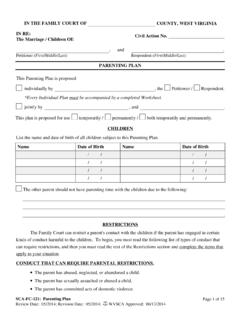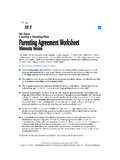Transcription of Florida Supreme Court Approved Family Law Form …
1 instructions FOR Florida Supreme Court Approved Family LAW FORM (c) RELOCATION/LONG DISTANCE parenting plan (02/18) When should this form be used? A parenting plan is required in all cases involving time-sharing with minor child(ren), even when time-sharing is not in dispute. The parenting plan must be developed and agreed to by the parents and every other person entitled to access or time-sharing with the child(ren) and Approved by the Court . Other Person means an individual who is not the parent, but with whom the child resides pursuant to Court order, or who has the right of access to, time-sharing with or visitation with the child(ren). If the parties cannot agree to a parenting plan or if the parents agreed to a plan that is not Approved by the Court , a parenting plan will be established by the Court with or without the use of parenting plan Recommendations.
2 The parents or Other Person must identify a name or designation to be used throughout this parenting plan . This form or a similar form should be used in the development of a parenting plan when you are planning to relocate your or the child(ren) s principal residence more than 50 miles from the principal place of residence: at the time of the last order either establishing or modifying time-sharing, or at the time of filing the pending action to either establish or modify time-sharing This form should be typed or printed in black ink. If an agreement has been reached, both parties must sign the parenting plan and have their signatures witnessed by a notary public or deputy clerk. After completing this form, you should file the original with the clerk of the circuit Court in the county where the petition was filed and keep a copy for your records.
3 You should then refer to the instructions for your petition, answer, or answer and counterpetition concerning the procedures for setting a hearing or trial (final hearing). If an agreed parenting plan is not filed by the parties, the Court shall establish a plan . IMPORTANT INFORMATION REGARDING E-FILING The Florida Rules of Judicial Administration now require that all petitions, pleadings, and documents be filed electronically except in certain circumstances. Self-represented litigants may file petitions or other pleadings or documents electronically; however, they are not required to do so. If you choose to file your pleadings or other documents electronically, you must do so in accordance with Florida rule of Judicial Administration , and you must follow the procedures of the judicial circuit in which you file.
4 The rules and procedures should be carefully read and followed. instructions for Florida Supreme Court Approved Family Law Form (c), Relocation/Long Distance parenting plan (02/18) IMPORTANT INFORMATION REGARDING E-SERVICE ELECTION After the initial service of process of the petition or supplemental petition by the Sheriff or certified process server, the Florida Rules of Judicial Administration now require that all documents required or permitted to be served on the other party must be served by electronic mail (e-mail) except in certain circumstances.
5 You must strictly comply with the format requirements set forth in the Rules of Judicial Administration. If you elect to participate in electronic service, which means serving or receiving pleadings by electronic mail (e-mail), or through the Florida Courts E-Filing Portal, you must review Florida Rule of Judicial Administration You may find this rule at through the link to the Rules of Judicial Administration provided under either Family Law Forms: Getting Started, or Rules of Court in the A-Z Topical Index. SELF-REPRESENTED LITIGANTS MAY SERVE DOCUMENTS BY E-MAIL; HOWEVER, THEY ARE NOT REQUIRED TO DO SO. If a self-represented litigant elects to serve and receive documents by e-mail, the procedures must always be followed once the initial election is made. To serve and receive documents by e-mail, you must designate your e-mail addresses by using the Designation of Current Mailing and E-mail Address, Florida Supreme Court Approved Family Law Form , and you must provide your e-mail address on each form on which your signature appears.
6 Please CAREFULLY read the rules and instructions for: Certificate of Service (General), Florida Supreme Court Approved Family Law Form ; Designation of Current Mailing and E-mail Address, Florida Supreme Court Approved Family Law Form ; and Florida Rule of Judicial Administration Where can I look for more information? Before proceeding, you should read General Information for Self-Represented Litigants found at the beginning of these forms. The words that are in bold underline in these instructions are defined there. For further information, see chapter 61, Florida Statutes, and the instructions for the petition and/or answer that were filed in this case Special At a minimum, the Relocation/Long Distance parenting plan must describe in adequate detail: How the parties will share and be responsible for the daily tasks associated with the upbringing of the child(ren), The time-sharing schedule that specifies the time that the minor child(ren) will spend with each parent and every other person entitled to access or time-sharing, A designation of who will be responsible for any and all forms of health care, school-related matters, including the address to be used for school-boundary determination and registration, other activities, instructions for Florida Supreme Court Approved Family Law Form (c), Relocation/Long Distance parenting plan (02/18)
7 The methods and technologies that the parties will use to communicate with the child(ren), and Any transportation arrangements related to access or time-sharing. The best interests of the child(ren) is the primary consideration in the parenting plan . In creating the parenting plan , all circumstances between the parties, including the parties historic relationship, domestic violence, and other factors must be taken into consideration. Determination of the best interests of the child(ren) shall be made by evaluating all of the factors affecting the welfare and interest of the particular minor child(ren) and the circumstances of the Family as listed in section (3), Florida Statutes, including, but not limited to: The demonstrated capacity and disposition of each party to facilitate and encourage a close and continuing parent-child relationship, to honor the time-sharing schedule, and to be reasonable when changes are required; The anticipated division of parental responsibilities after the litigation, including the extent to which parental responsibilities will be delegated to third parties.
8 The demonstrated capacity and disposition of each party to determine, consider, and act upon the needs of the child(ren) as opposed to the needs or desires of the parent; The length of time the child(ren) has lived in a stable, satisfactory environment and the desirability of maintaining continuity; The geographic viability of the parenting plan , with special attention paid to the needs of school-age children and the amount of time to be spent traveling to effectuate the parenting plan . This factor does not create a presumption for or against relocation of either party with a child(ren); The moral fitness of the parties; The mental and physical health of the parties; The home, school, and community record of the child(ren); The reasonable preference of the child(ren), if the Court deems the child(ren) to be of sufficient intelligence, understanding, and experience to express a preference; The demonstrated knowledge, capacity, and disposition of each party to be informed of the circumstances of the minor child(ren), including, but not limited to, the child(ren) s friends, teachers, medical care providers, daily activities, and favorite things.
9 The demonstrated capacity and disposition of each party to provide a consistent routine for the child(ren), such as discipline, and daily schedules for homework, meals, and bedtime; The demonstrated capacity of each party to communicate with and keep the other part(y)ies informed of issues and activities regarding the minor child(ren), and the willingness of each party to adopt a unified front on all major issues when dealing with the child(ren); Evidence of domestic violence, sexual violence, child abuse, child abandonment, or child neglect, regardless of whether a prior or pending action relating to those issues has been brought. If the Court accepts evidence of prior or pending actions regarding domestic violence, sexual violence, child abuse, child abandonment, or child neglect, the Court must specifically acknowledge in writing that such evidence was considered when evaluating the best interests of the child(ren); Evidence that any party has knowingly provided false information to the Court regarding any prior or pending action regarding domestic violence, sexual violence, child abuse, instructions for Florida Supreme Court Approved Family Law Form (c), Relocation/Long Distance parenting plan (02/18) child abandonment, or child neglect.
10 The particular parenting tasks customarily performed by each party and the division of parental responsibilities before the institution of litigation and during the pending litigation, including the extent to which parenting responsibilities were undertaken by third parties; The demonstrated capacity and disposition of each party to participate and be involved in the child(ren) s school and extracurricular activities; The demonstrated capacity and disposition of each party to maintain an environment for the child(ren) which is free from substance abuse; The capacity and disposition of each party to protect the child(ren) from the ongoing litigation as demonstrated by not discussing the litigation with the child(ren), not sharing documents or electronic media related to the litigation with the child(ren), and refraining from disparaging comments about any other party to the child)ren); and The developmental stages and needs of the child(ren) and the demonstrated capacity and disposition of each party to meet the child(ren) s developmental needs.
